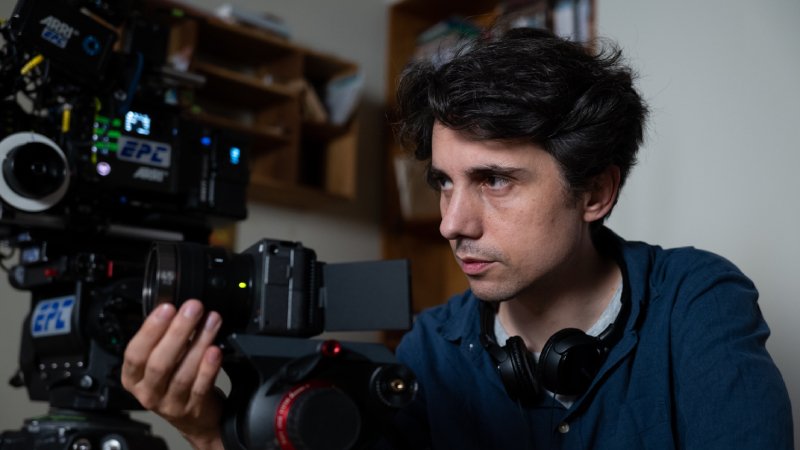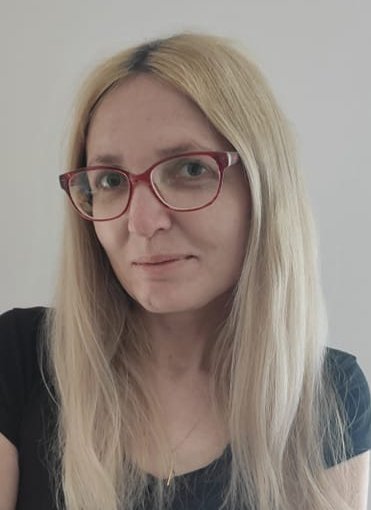




Spanish director Jonas Trueba is 42 years old, but he looks much younger. Having founded his own production company Los Ilusos Films in 2013, he has been releasing roughly a film per year. These are mostly low-budget works with filmmaking characters and heroes. This makes his movies particularly popular with film professionals and cinephiles. His new film The Other Way Around, about a film director and an actor preparing for divorce, is no exception. Jonas is the son of Oscar-nominee director Fernando Trueba, who also stars in his latest film. The Other Way Around won the Best European Film Prize at Director’s Fortnight at Cannes this year, where this interview was conducted.
…
.
Nataliia Serebrikova – A lot of people have been through a separation, but they don’t throw a party…
Jonas Trueba – These are the things that happen in life. You could make a television series of four, five seasons. When a couple decides to separate, they’ve already been through the process of thinking, talking, suffering. The decision is made, and it’s settled. But then as soon as they make the announcement to others, these people come back to you and question the process again. And so you have to justify yourself, you have to console them, you have to go through the process yourself again as the others come to you and react to your decision.
NS – What was your motivation behind The Other Way Around?
JT – As a film director, I find it motivating to build movies on very simple ideas, material things, even fragile. Like a witty phrase. I like the challenge of building a film from almost nothing.
NS – Was this a crazy American idea?
JT – Yes, I’ve heard that there are more and more of them [divorce parties] in the US and even in Spain. But for me, it wasn’t about the social phenomenon. It was more an idea that my father brought up when I was a teenager. He once told me that there’s nothing wrong with separations, and that they should even be celebrated.
And this is something that I’ve always kept in my mind, not in a frivolous tone, but like a very beautiful idea. And I think that it also has to do with my father’s character: he tries to escape sadness and suffering. So it’s a way of trying to avoid suffering and see the good side of things. I find the idea beautiful, just not very practical. Yet it’s very realistic.
The utopian side of this idea is very cinematic. I think cinema is a place neither completely utopian nor entirely realistic. The perfect zone for filmmaking is somewhere between the two. I wrote the script with the two protagonists, Itsaso Arana and Vito Sanz, with all of this is mind.

NS – The film has a complex structure. Did you film chronologically?
JT – We had the first version, and then we kept changing things as we shot. We didn’t shoot chronologically because that wasn’t necessary, and also because of the repetitive structure of the movie. The film is built into pieces that you can almost exchange and move around.
NS – What I find always impressive in your films is how alive they are and how organic everything seems. How do you achieve this?
JT – Thank you very much for saying this. That’s very comforting to hear. The whole process of filmmaking is very horizontal. We create together with the crew, with the cast. We are honest, humble and open to changes. We tend to show people, stories, places, things quite close to what they actually are. We’re very transparent. That’s unusual nowadays in cinema. When I go to the movies as a viewer, very often I have the impression that what I’m being shown is overworked.
NS – I think you have your own unique style of filmmaking. Please tell us more about how you work with actors and crew.
JT – I’m not sure whether we have a method. We have a common journey. We tend to start with something very casual, a documental portrait of something that happened to us, something that got our attention. We then work this material in order to squeeze some fiction out of it. We don’t expect a genius idea or something spectacular. It’s really about starting with the bits and pieces of everyday life and transforming it to fiction.
NS – Filmmaking is an expensive art form. How challenging is it to make low-budget films, particularly one after the other?
JT – I’m happy that you’re asking this question. It’s true that cinema is an art form that heavily relies on money. It’s a very materialistic way of expression, that you cannot deny. No matter how low the budget of your film, you still have to confront this material aspect of it. This has always been at the heart of my relation to filmmaking. That’s why it was important for me to have my own production company.
At the same time, the low budget gives us an illusion of luxury, limitless possibilities. We don’t pretend that we have double the budget. Instead, we adjust our desires, our inspirations, our ideas, to the means at our disposal.
…
.J
Jonas Trueba is pictured on both images featured on this interview.
















